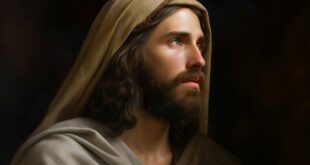Hebrews 11:1 Now faith is the substance of things hoped for, the evidence of things not seen.
In the opening pages of ‘The Hobbit’, by J.R.R. Tolkien, Bilbo Baggins receives an invitation to go on a journey. Surrounded by comfort, security and certainty, it comes swooping down upon him unexpectedly. This is Bilbo’s crisis moment. It’s his moment of separation from the old, his moment of opportunity for something new. It is in fact, the moment Bilbo needs in order to keep going, keep growing.
At the threshold of a crisis moment we can either let feelings of fear and uncertainty keep us in the same old patterns or as we put our faith and trust in God, allow the invitation for change to move us onto a journey of transformation. A crisis summons us to cross the threshold. There is both a leaving behind, a separation from the old, and an opportunity to look ahead to take hold of something new that is yet unseen.
Genesis 12:1-4 Now the LORD had said unto Abram, Get thee out of thy country, and from thy kindred, and from thy father’s house, unto a land that I will shew thee: And I will make of thee a great nation, and I will bless thee, and make thy name great; and thou shalt be a blessing: And I will bless them that bless thee, and curse him that curseth thee: and in thee shall all families of the earth be blessed. So Abram departed, as the LORD had spoken unto him; and Lot went with him: and Abram was seventy and five years old when he departed out of Haran.
Abram understood the emotions that surfaced in the midst of a crisis moment. At 75 he was most likely quite comfortable surrounded with family and the fruitfulness of a prosperous life. (Genesis 13 says that Abram was very rich in cattle, in silver, and in gold.) Long distance travel, especially by foot, with an entourage of his possessions, was most likely far from his mind. Leave that to the younger sect.
Imagine how God’s call may have left him feeling. Uncertain. Tired. Confused. And no doubt questioning whether he needed his ears tested. But Abram was a man of faith. Despite his feelings, he trusted God. He believed God at His Word and acted upon it no matter how he felt, believing that God’s promises would prove true. Even at 75 Abram must have been a determined, faith-filled man. He had not allowed his comforts to lull him into a state of apathy or disregard for God. He left Haran. He may have hesitated with some degree of human doubt, (we are not told in the narrative) but he chose to obey God and left.
Let’s consider for a moment what God is calling us into right now and what we need to leave behind. Perhaps relationships that steal our joy, or maybe harmful habits, small-minded thinking, distorted perceptions about God and His Word, or even a lifestyle that keeps us too safe, too comfortable, too selfish? And what opportunities arise that God is leading us into? Do they offer the prospect of a new direction and new experiences that draw us closer to God, closer to others and closer to discovering more about ourselves?
In the day of crisis there’s a decision to be made. Do we confront the fear of uncertainty and in faith allow God to bring us through whatever lies ahead, or do we let ourselves be swamped by fear and retreat back into what leaves us in safer territory, but still with unfulfilled longings? Even Bilbo Baggins had a whispering in his heart that although life was good, there had to be something more.
It is normal to experience feelings of fear, doubt, concern and confusion. These are feelings inbuilt by our Designer God himself. But it is what we choose to do with them that counts. A study of Abram and other notable Biblical characters reveals that they rose up above their fears, when called by God and trusted Him regardless.
Hebrews 11:6 But without faith it is impossible to please him: for he that cometh to God must believe that he is, and that he is a rewarder of them that diligently seek him.
Acting in faith, not fear, is what pleases our LORD. Abel, whose sacrifice pleased God, offered it to God in faith, and his brother Cain, did not. Abraham believed God at His Word and it was credited to him as he was found righteous before God. Rahab proved her allegiance to God and faith in His promises when she protected the Israelite spies and God saved her and her family. Moses by faith chose not to be identified with the temporary pleasures of Pharoah’s house but sought out his Israelite heritage and bore the same sufferings that they experienced. In His pleasure, God exalted Moses to be a great leader and deliverer. The list of accomplishments through faith is detailed in the Hall of Faith chapter in Hebrews 13, for our encouragement to step further into faith that pleases God.
Faith walks with hope in the future that God has prepared for us, rather being controlled by our feelings in the present. What feeling based actions have we taken recently, rather than acting in faith and depending upon God and His Word? God calls us to walk into each day with our head held high and a confidence in our hearts that all our steps are ordered by Him. There is nothing that will happen to us that He has not orchestrated for our good and His pleasure. Let’s walk the journey ahead with faith, obediently answering His call-in times of change and looking unto Jesus, the founder and perfecter of our faith.
Father, You have given me the eye of faith to see You as Father, to know You as a covenant God and to experience your love in me. But my faith is weak and wavering, its light dim, its increase slow, its backslidings frequent. Feelings of fear and uncertainty have directed me into choices that are not pleasing to You. Lord, fan this divine spark of faith into a glowing flame until Heaven fills my soul and all impurity in me is cast out. Thank You.
 The Bottom Line, Ministries Christian News, Articles, & Poetry
The Bottom Line, Ministries Christian News, Articles, & Poetry 





Jennifer,
Thank you for such a detailed and important message of significance!
Have a Blessed day~
so wonderful